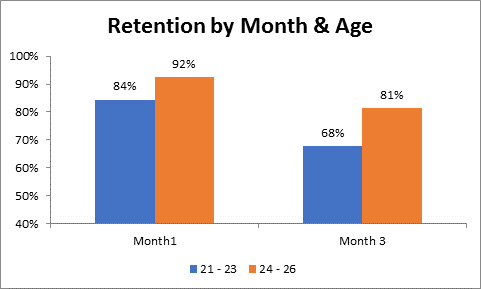Three out of ten youth will quit work within three months. This is according to research conducted by Lulaway, a social enterprise dedicated to entry-level recruitment.
“With a national youth unemployment rate of over 48% (aged between 15 and 24, including young people Not in Education, Employment, or Training (NEET)), logic dictates that securing any form of employment would be an accomplishment that someone would not want to give up easily,” says Jake Willis, CEO of Lulaway.
Receiving cover 10,000 job applications per month, the company has registered over 220,000 South African job seekers, sent 55,000 suitable candidates for job interviews, and placed 125,000 people in jobs through an established network of 160 network partner job centres. With its national footprint across nine provinces, Lulaway has kept track of thousands of employees in entry-level positions in warehousing, retail, fast-food and security. The company’s data gathered indicates that younger employees have the poorest job longevity. Willis says these statistics highlight the complexity of sustainable job creation. “There are two distinct components to long-term job creation. The first, and simpler, one is creating employment opportunities. The second, and more complex aspect, is job sustainability. We are finding that even when given employment opportunities, many young people struggle to transition permanently into the formal economy.
“New employees between the ages of 21 and 23 are the most vulnerable to early drop-offs and 16% of all new employees in this age group will leave within the first month, compared to 8% aged between 24 and 26.
“At the three- month mark, the 21 to 23 age group drop-off rate is even more alarming, with 32% of new employees in this age group leaving their jobs by month three, compared to 19% of those between the ages of 24 and 26.”

He adds that understanding the socio-economic context of young employees may provide answers to the chronic youth unemployment epidemic.
“The youth between 21 and 23 often don’t have dependents and live at home. As they have minimal financial responsibilities, they don’t have the resilience to push through the initial challenges. They leave their tertiary studies with the expectation of a well-paid job and don’t understand that you must start at the bottom and work your way up. Hard work and talent are quickly noticed, but you need that work experience, no matter how menial and low-paying the job is initially,” says Willis.
He says entry level jobs are by their nature menial and physically grueling and offer little return. “Once transport and food is paid for, the employee goes home with a few hundred rand. In the short term, young people don’t see the benefit of working so hard for so little money. They don’t see the necessity of work experience in creating long-term success. “
This high rate of early-drop off means that job creation success cannot be measured by placements alone. Inroads into employment creation will only be made once the underlying issues that stop youth from keeping jobs are addressed.
Early drop-offs mean that employers spend expensive resources on recruitment and training, only to get a poor return on investment. This results in employers looking for alternatives such as external service providers instead of employing in-house.
“The common myth is that there are not enough jobs available. On the contrary, there is a surplus of entry-level jobs at any given time, but there are not enough strategic resources dedicated to ensuring job longevity,” says Willis.
From the ground up – a unique approach to bridging the gap
Willis says Lulaway interacts face-to-face and telephonically with hundreds of job seekers daily. “These young people face a complex range of social and logistical challenges. Obstacles such as a lack of transport money, poor nutrition and an absence of mentors mean that employees starting out need an external support structure to succeed.
“We realised that if we wanted to facilitate concrete transformation in the labour market, we could not ignore these obstacles. We could not place a young person in a job with no support and expect them to thrive.
“While we have always supported job seekers and new employees, we decided to formalise this focus strategically through LulaLAB, a new division solely focused on job retention initiatives. We are in the pilot phase, and have received funding from the Michael & Susan Dell Foundation to develop the best methodology to provide early employment support,” says Willis.
Lulaway constantly develops innovative strategies to help young people stay in their jobs. In addition to telephonically mentoring new employees weekly, it also employs interventions such as food vouchers, medical aid and interest-free loans. In addition, it offers buddy programmes, group leaders and incentive programmes to smooth the transition into formal employment.
“Once we have fine-tuned our model, we will source partners to replicate it on a large-scale. Increased retention benefits all stakeholders. Employers’ productivity and its bottom line increase, and employees’ careers can grow,” says Willis.
“Ultimately, we believe Lulaway is paving a promising path for young South Africans, offering them the best chance of success in the working world,” concludes Willis.
About Lulaway:
Lulaway is a recruitment company that specialises in entry-level placements, sourcing relevant government stipend funding for employers, and handles all management and logistics aspects. The company has facilitated the disbursement of R40 million in stipend funding to unemployed youth.
Lulaway’s public partners include the National Youth Development Agency (NYDA), Gauteng Department of Social Development, provincial governments and the Tshepo 500k project.






















































































